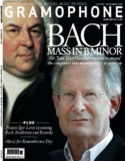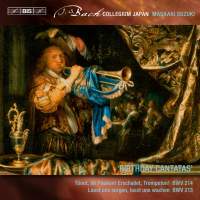Texte paru dans: / Appeared in: |
|
|
Outil de traduction (Très approximatif) |
|
|
Reviewer: Jonathan Freeman‑Attwood
With all the trappings of secular commissions – including additional remuneration and an opportunity for luxuriant scoring – Bach wrote these two birthday cantatas for members of the Elector of Saxony’s family in the early 1730s with texts by the librettist Picander, he of the St Matthew Passion. Both works were recast soon afterwards as key movements of the Christmas Oratorio which has, arguably, hampered our appreciation of them; the lustful implications of sleep in ‘Schlafe, mein Liebster’ in No 213 (‘Hercules at the Crossroads’, as the work has become best known) transformed into the tender cradle aria in Part 2 of the oratorio might render the original as the poor (and undesirable) relation.
To regain the initiative for these pieces, Suzuki inflects the music skilfully by projecting fully the dramatic essence and character of the secular texts. In this fifth disc of secular cantatas, the arias especially contain a spirit of abandon and gestural immediacy which might wear thin in the context of a large-scale oratorio but are deftly realised in pacy tempi, vibrant wind obbligatos and immediacy of articulation.
The allegorical figures are affectingly presented, with Joanne Lunn consistently accomplished in almost all her tasks (if with a slight tendency to bulge rather unyieldingly on long notes). She’s delectably Semele-like in Bellona’s flirtatious aria in No 214, the only aria in either work for which Bach found no place in the Christmas Oratorio. Robin Blaze, as Hercules, moves heroically through the temptations of depravity towards longed-for virtue. Dominik Wörner is no Peter Kooij but does a serviceable job in the master’s absence.
The choruses exhibit buoyancy as well as beautifully rich and balanced recorded sound. The challenge to modern ears remains the super-‘historical’ brass (horns and trumpets respectively), bravely played on instruments without the modern corrective of tuning holes. Whether this accounts for the flatness prevalent in the opening of BWV213, the effect is something of a double-edged sword in weighing up the beauties of ‘authentic’ timbre and our expectation these days to hear music ‘in tune’. Discuss! |
|
|
|
|
|
Cliquez l'un ou l'autre
bouton pour découvrir bien d'autres critiques de CD |
|




